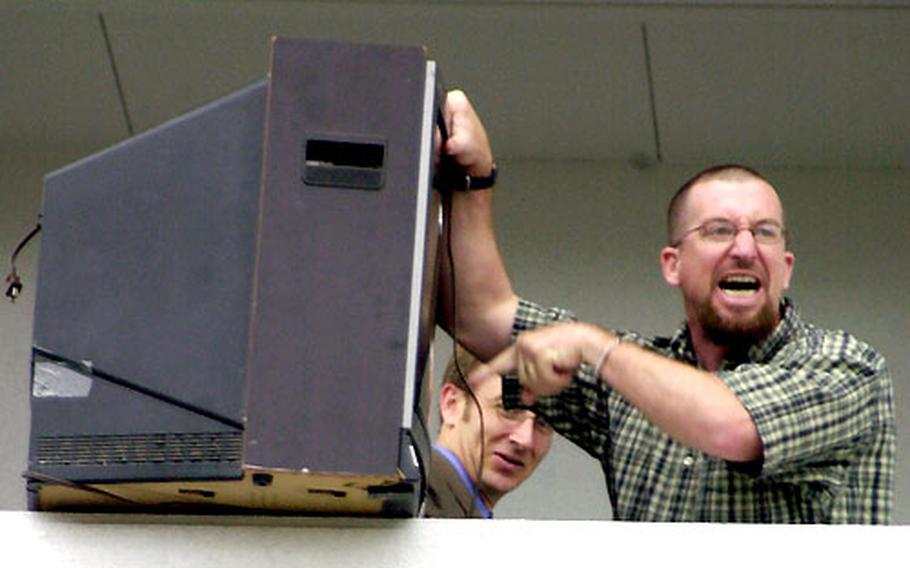
Ernest J. King High School teacher Kevin McGrath prepares to push a television set off a second-story ledge at the Sasebo Naval Base school on Tuesday. (Greg Tyler / Stars and Stripes)
SASEBO NAVAL BASE, Japan — Chaos and anarchy ruled when a normally gentle English teacher morphed into a red-faced, screaming, revolution-crazed rebel, shaking his fists at a playground full of students observing his seemingly rabid behavior from below a second-floor ledge.
Then, with just a few minutes left before the first school bell, Ernest J. King High School teacher Kevin McGrath lost his grip entirely, and launched a 25-inch color television on a short flight to complete destruction.
“At least,” one adult bystander quipped, “he’s not Chicken Little and the sky ain’t falling.”
The sacrifice of the completely functional TV early Tuesday was symbolic theater as part of National TV-Turnoff Week, which continues through Saturday.
English teacher McGrath used the unorthodox visual aid to ignite, he hopes, a realization among students that life exists beyond the flickering box.
“The real message from me,” he said, is that children don’t really need television to show “that basketball, skating, kite-flying, bowling, walking, reading, writing, playing with water balloons, board games, dancing, singing, tooting a horn or anything is fun. Just grab a friend or two and do it. There’s a lot more to life than TV.”
TV-Turnoff Week is an observance cultivated by the TV-Turnoff Network, formerly TV-Free America, a nonprofit organization that encourages children and adults to watch less television to promote healthier lives and communities.
Founded in 1994, McGrath said, the organization is dedicated to a “belief that people have the power to determine the role that television plays in our own lives.”
Enlisting the help of other teachers and staff, McGrath organized activities all week to make the point, including an opportunity Friday for students to pitch baseballs with all the heat they can summon straight into the carcass of the dead television.
Activities edging a little closer to normal included potato sack races, skating and free-throw shooting at the base’s skate park. Later this week, there’ll be water-balloon dodge ball, bowling, a chess tournament, freestyle poetry reading, breakdancing and a dance.
“I’m an English teacher, so naturally, I’d love for them to read, write and experiment with theater,” said McGrath, adding that essay and poster contests also are slated this week.
“However, I’m also an outdoorsman, and enjoy physical activities,” he said. “I’ve watched some physical education classes at this school, and I’m positively struck by how good they are; every time I walk by, they are doing something cool that makes me want to play, too.”
Said junior Emily Bogen said, “I think crashing that television made people realize TV is a bad thing; it’s an enemy. Watching that TV crash ... makes them think of the negative effects television has on their minds.”
TV-Turn Off Week also is satisfying to her “because I don’t have cable, and I see the difference between myself and my peers. I see what people are buying … not just products … but behaviors and values. I think it’s easier to be an individual without much TV.”
More than 3,000 studies now show that television has a measurable impact on youth behavior, McGrath said.
“Here’s a scary fact: Paraphrasing former FCC (Federal Communications Commission) Chairman Newton Minnow — by the time most Americans are 18, they’ve spent more time watching television than going to school, and far more than they’ve spent talking with teachers, friends and even their parents,” he said.
King sophomore Alex Coronel says he’s committed to the TV-Turn Off Week principles — and the flying television set “was just awesome; it was so cool. People can see how we should stop watching TV because the TV will control your mind.”
Visit www.tvturnoff.org for more information about the weeklong observance.